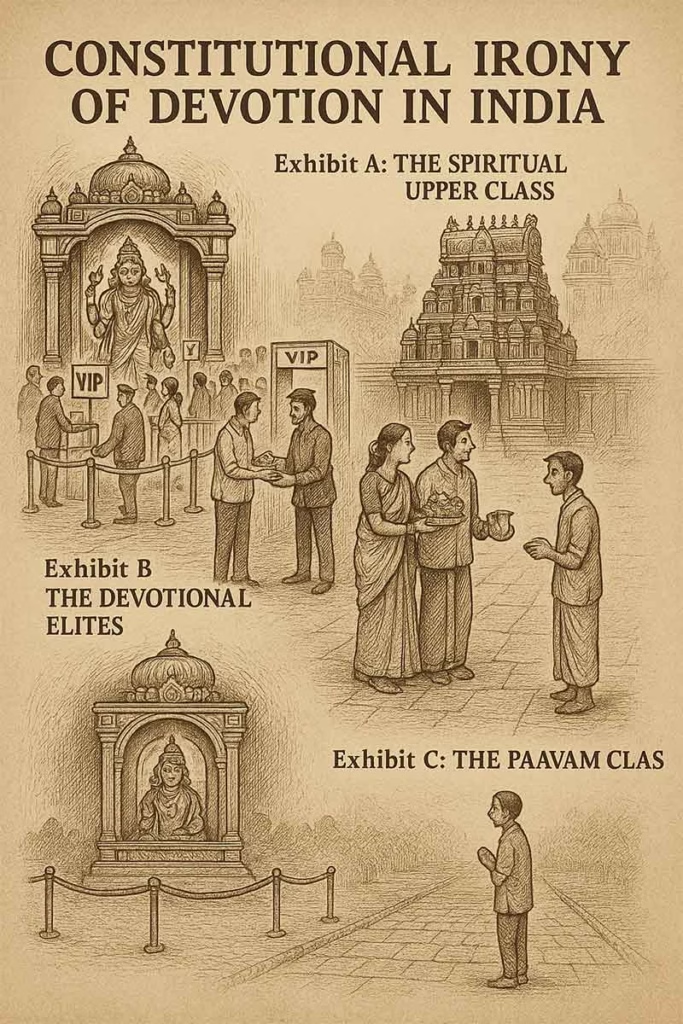
In the Indian Sub continent, god is everywhere except when we try to see him.
The god defined as juristic entities entrusted with legal rights becomes accessible with different menus.
Stand in queue for endless hours or pay Rs. 100/- VIP Darshan or hiring a Archagar(Priest). God can be accessed mainly through these ways.
Which brings us to a genuine discussion that Who is Paavam (Tamil word for Innocent and naive) among these?
Let’s examine this with the help of constitution of India.
Exhibit A: The Spiritual Upper Class
We live in a time where the small deities have been confiscated and instituionalised into boundaries of supreme gods (Shiva, Brahma, Vishnu and their immediate legal heirs). For some, god is divine and to some the juristic entity is a corporate venture.
Unlike the humble village deities that can be easily accessible. Mostly withing struggling small temples, these supreme gods institutions resides under the ownership of Government complexes. They demand different ways probably to reach heaven. Protected by barriers, scanners and multiple price slabs.
In such utopian thought, there exists a group of people that are highly delighted to get a Rs. 100 ticket that is being legally sold by the Temple management. It provides a shortcut to a line that is way too long, as it is used the class that had decided not to invest any in reaching heaven.
Yet it takes hours in well celebrated temples around the country to peek an angle of the supreme god of that particular temple probably for very few seconds like a glassed celebrity.
In here, god is well preserved to be presented away in a considerable distance from this Exhibit devotees.
Still Article 25 of Indian Constitution guarantees for equal right for all to freely profess and practice religion. And yes, temples are considered public property irrespective of their god’s status.
Exhibit B: The Devotional Elites
They just don’t buy a ticket, they buy influence, prestige and much sophisticated way to heaven.
There will be priests standing all around entrances of the gigantic temples holding astounding architecture with an oral offer letters. They hire the priests, who will then act as their private event manager.
Offer 1: To sit before God for a minute Rs. 5,000/- for family
Offer 2: Stand closer to God for 30 Seconds Rs. 1,000/- person
Add ons: To do ceremonial worship Rs. 500/-
(These offers are the minimum slab rates.)
Lucky for the devotees, there is no CGST and SGST.
Unlike the legal route being sold directly by the government, this exhibit has some complications.
The Complicated part is to run behind the hired priest that will be running beyond the preventive rope barriers kept for devotees in line. The person who had hired the priest sometimes has to overtake the existing line to catch up with the priest who is very influential in opening many doors of line obstacles, barriers and finally the door to heaven like a PA to the politician.
The priest will be handed over the worship items when they all had arrived at the private chamber of the god. And the priest will do the worship.
If the priest is well influential, he could get his clients some flowers straight from deity itself.
And yet Article 15(2)(b) of Indian Constitution prohibits discrimination based on religion, race, caste, sex, place of birth, or any combination thereof, in the use of public facilities like wells, tanks, bathing ghats, roads, and public places maintained by the state or dedicated to public use.
May be it should explicitly mention wallet size.
Exhibit C: The paavam class
The most innocent souls are this forgotten masses that was denied the access to divinity and special subscription to God.
These people wait for hours and hours and chant with full bhakti.
But They can only see a golden flash from a long distance for a second that has to be interpreted by themselves as God.
These endangered believers unfortunately is relying on faith than wallet. Most constitutional and thus more ignored.
Yet the Article 14 of the World’s largest Constitution will say equality before law and equal protection of the law.
Who exactly is the real paavam here?
Let’s be clear. Even the ₹100 and ₹5,000 devotees can become paavams if an influential official visits the temple.
Then, everyone VIP, priest, or ₹10 panjamirtham/laddoo buyer is pushed back.
The temple becomes a cordoned-off fortress, and only one person the Very Important Devotee gets darshan.
So who is the most paavam?
The devotee standing in the free line?
The devotee buying his faith like a luxury product?
The priest who turned into a booking agent?
None.
The most paavam is God Himself.
He stands there, trapped behind glass and taxes, forced to accept corporate-style bookings and ceremonial showpieces in His name.
He cannot file a writ under Article 32 or Article 226.
He cannot claim life or personal liberty under Article 21.
He cannot question the temple administration, the ticket counters, or the price slabs.
When faith becomes a product, and darshan a paid experience, we don’t just lose our spirituality we violate the spirit of the Constitution itself.
It’s not just a moral tragedy.
It is a constitutional contradiction.
And in that contradiction, the most helpless the most paavam remains the God we claim to worship.
Subscribe to Our Newsletter
Get the latest CounterCurrents updates delivered straight to your inbox.
M. Aswin Rome Pon Saravanan is a practising advocate from Tirunelveli District Tamil Nadu









































